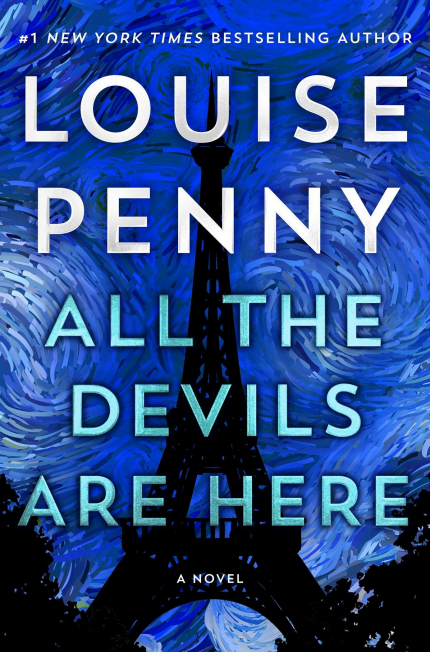All the Devils Are Here (Chief Inspector Armand Gamache #16), by Louise Penny

All the Devils Are Here by Louise Penny
My rating: 3 of 5 stars
I’m writing this review with a heavy heart because I’ve been a fan of Armand Gamache since the very first book.
Gamache is the most human investigator I’ve had the pleasure to “accompany” him through 16 books now. His cases were never easy or clear-cut. There were rarely any truly, irredeemable evil perpetrators.
Gamache himself wasn’t always the knight in shining armour but a believable human being.
Three Pines, the almost mythological home of the Gamaches’, basically became a beloved part of (almost) all the books. Its inhabitants – Clara, Gabri, Ruth – they usually played an important role.
In this book, though, Armand and his entire family find themselves in Paris for the birth of Annie’s and Jean-Guy Beauvoir’s child where the latter live after Jean-Guy got a job at an engineering company.
Also in Paris is Stephen Horowitz, Armand Gamache’s godfather, who took care of young Armand after the death of Armand’s parents.
After a family dinner, an attempt on Stephen’s life is made and, thus, the game is afoot!
I was immediately sceptical when I realised we would stay in Paris for (almost) the entire book. Three Pines is so atmospherically important that I missed it.
As an IT guy I couldn’t really tolerate this either:
“Beauvoir could see past Loiselle, into Arbour’s office. Something was happening. The computer had come back to life, and images were flashing across the screen. Even from a distance, he could see what it was. Emails. Schematics. Being erased.”
This is just nonsense and only ever happens in films. In real life, you wouldn’t see a thing. The data would silently be deleted and none would be the wiser for it. This is, of course, just a detail but it annoyed me.
Attention to details in an author has always been important to me and Louise Penny didn’t majorly disappoint so far but in this book, she just does away with some things, e. g. Horowitz’ children:
“I do need to point out that in a previous book Horowitz has children. In this book he does not. I’m afraid I made a mistake in that first mention of Horowitz, in being far more specific than I needed to be.
Lesson learned. Children erased.”
Children erased. Just like that. Annoying.
These are just my minor qualms with the book, though. What really disappointed me was that Armand Gamache almost turns into an action hero in this book. His more philosophical traits take a backseat to a mystery that’s not even very interesting intrinsically.
The solution feels a lot like a deus ex machina after a rather complicated, convoluted and far-fetched plot that wasn’t hard to follow but wasn’t really interesting either.
In her afterword, Penny explains why she wrote the book the way she did:
“I’ve tried to bring that wonderment. That awe. That love of place because of the place, but also because of the memories a place holds, to this book. That love of Paris that I discovered with Michael.”
I love Paris myself but apart from the fact that I bought a mystery novel and not a book about Paris, Penny regrettably even fails to convey how Paris “feels”: Yes, she describes it well enough but the bustling streets, the Parisians themselves, the contrasts of the touristic Paris and its darker sides – they’re all missing. It’s a pretty sterile description of places but the “awe” she mentions is absent for me.
I can absolutely relate to “explore” Paris with your significant other (been there, done that) but unless you write about Paris, you cannot really convey that to your readers.
A bit later Penny writes…
“This is a book about love, about belonging. About family and friendship. It’s about how lives are shaped by our perceptions, by not just our memories, but how we remember things.”
… and she’s right: She wrote about the Gamaches’ and their love for each other. Unfortunately, that’s not enough for a good Gamache mystery, though.
Especially when the (few) conflicts among the family (Armand and his son Daniel) feel mostly superficial.
The one potential major conflict among the family in this book that is not about Daniel is, disappointingly again, solved within six sentences (the new-born child…) and feels artificial and “tacked-on”.
Just as the ending made me roll my eyes (Stephen).
No, sadly, this is the one Gamache you should probably skip if you want to remember Armand Gamache as he used to be. Let’s hope for a better 17th instalment next year.
View all my reviews